

Objective Journalism vs. Partisan Journalism - College Essay - Avesspecto. Ben Thompson Rachel Miller DIS 611, W 9 a.m.
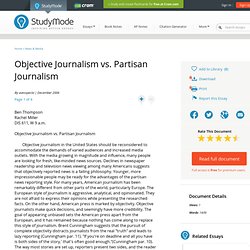
Objective Journalism vs. Partisan Journalism Objective journalism in the United States should be reconsidered to accommodate the demands of varied audiences and increased media outlets. With the media growing in magnitude and influence, many people are looking for fresh, like-minded news sources. Declines in newspaper readership and television news viewing among many Americans suggests that objectively reported news is a failing philosophy.
Cunningham says the failure of the press is their dedication to style, creating not only passive journalism, but also passive readers. Objectivity & Balance: Today's Best Practices in American Journalism. Journalistic objectivity. It cannot be gainsaid that a journalist has a very important position and role in our society.
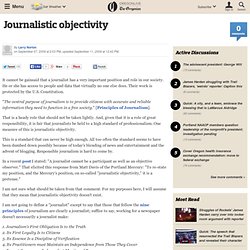
He or she has access to people and data that virtually no one else does. Their work is protected by the U.S. Rethinking Journalism Ethics, Objectivity in the Age of Social Media. In response to the rapidly changing media environment, many schools and academic programs are offering novel approaches to journalism education.
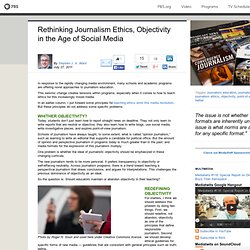
This seismic change creates tensions within programs, especially when it comes to how to teach ethics for this increasingly mixed media. In an earlier column, I put forward some principles for teaching ethics amid this media revolution. But these principles do not address some specific problems. Whither objectivity?
Today, students don’t just learn how to report straight news on deadline. Schools of journalism have always taught, to some extent, what is called “opinion journalism,” such as learning to write an editorial that supports a candidate for political office. Principles of Journalism. The first three years of the Project’s work involved listening and talking with journalists and others around the country about what defines the work.

What emerged out of those conversations are the following nine core principles of journalism: 1. Journalism’s first obligation is to the truth Democracy depends on citizens having reliable, accurate facts put in a meaningful context. Public Journalism and the Problem of Objectivity. Questioning Journalistic Objectivity. Journalism, as we've known it, has been mourned deeply over the last few years.
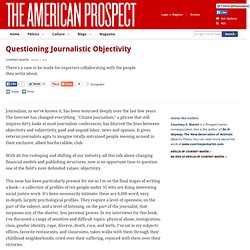
The Internet has changed everything. "Citizen journalism," a phrase that still inspires dirty looks at most journalism conferences, has blurred the lines between objectivity and subjectivity, paid and unpaid labor, news and opinion. It gives veteran journalists agita to imagine totally untrained people messing around in their exclusive, albeit hardscrabble, club. With all this reshaping and shifting of our industry, all this talk about changing financial models and publishing structures, now is an opportune time to question one of the field's most defended values: objectivity.
This issue has been particularly present for me as I'm on the final stages of writing a book -- a collection of profiles of ten people under 35 who are doing interesting social justice work. An Argument Why Journalists Should Not Abandon Objectivity. In “Losing the News: The Future of the News that Feeds Democracy,” published by Oxford University Press, Alex S.
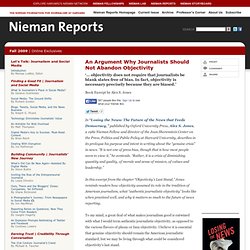
Jones, a 1982 Nieman Fellow and director of the Joan Shorenstein Center on the Press, Politics and Public Policy at Harvard University, describes in its prologue his purpose and intent in writing about the “genuine crisis” in news. “It is not one of press bias, though that is how most people seem to view it,” he contends. “Rather, it is a crisis of diminishing quantity and quality, of morale and sense of mission, of values and leadership.” In this excerpt from the chapter “Objectivity’s Last Stand,” Jones reminds readers how objectivity assumed its role in the tradition of American journalism, what “authentic journalistic objectivity” looks like when practiced well, and why it matters so much to the future of news reporting.
I define journalistic objectivity as a genuine effort to be an honest broker when it comes to news. But what, exactly, was objective journalism? Objectivity in Journalism. DAVID BROOKS There is some dispute about whether objectivity can really exist.

How do we know the truth? Well, I’m not a relativist on the subject. I think there is truth out there and that objectivity is like virtue; it's the thing you always fall short of, but the thing you always strive toward. And by the way, I think that opinion journalists have to be objective just as much as straight reporters. Opinion journalists, too, have to be able to see reality wholly and truly. What are the stages of getting to objectivity? The second stage is modesty. The same thing has to happen for journalists. The third stage of objectivity is the ability to process data — to take all the facts that you've accumulated and honestly process them into a pattern. Objectivity and Fairness - Objectivity and fairness in news stories. You hear it all the time – reporters should be objective and fair.
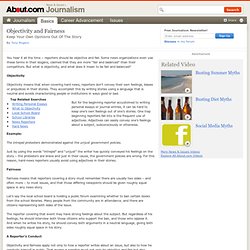
Some news organizations even use these terms in their slogans, claimed that they are more “fair and balanced” than their competitors. But what is objectivity, and what does it mean to be fair and balanced? Objectivity Objectivity means that when covering hard news, reporters don’t convey their own feelings, biases or prejudices in their stories. They accomplish this by writing stories using a language that is neutral and avoids characterizing people or institutions in ways good or bad. But for the beginning reporter accustomed to writing personal essays or journal entries, it can be hard to keep one’s own feelings out of one’s stories. Example: The intrepid protesters demonstrated against the unjust government policies.
Just by using the words “intrepid” and “unjust” the writer has quickly conveyed his feelings on the story – the protesters are brave and just in their cause, the government policies are wrong. "Defining Objectivity within Journalism" ASJA. "Objectivity's Prophet"